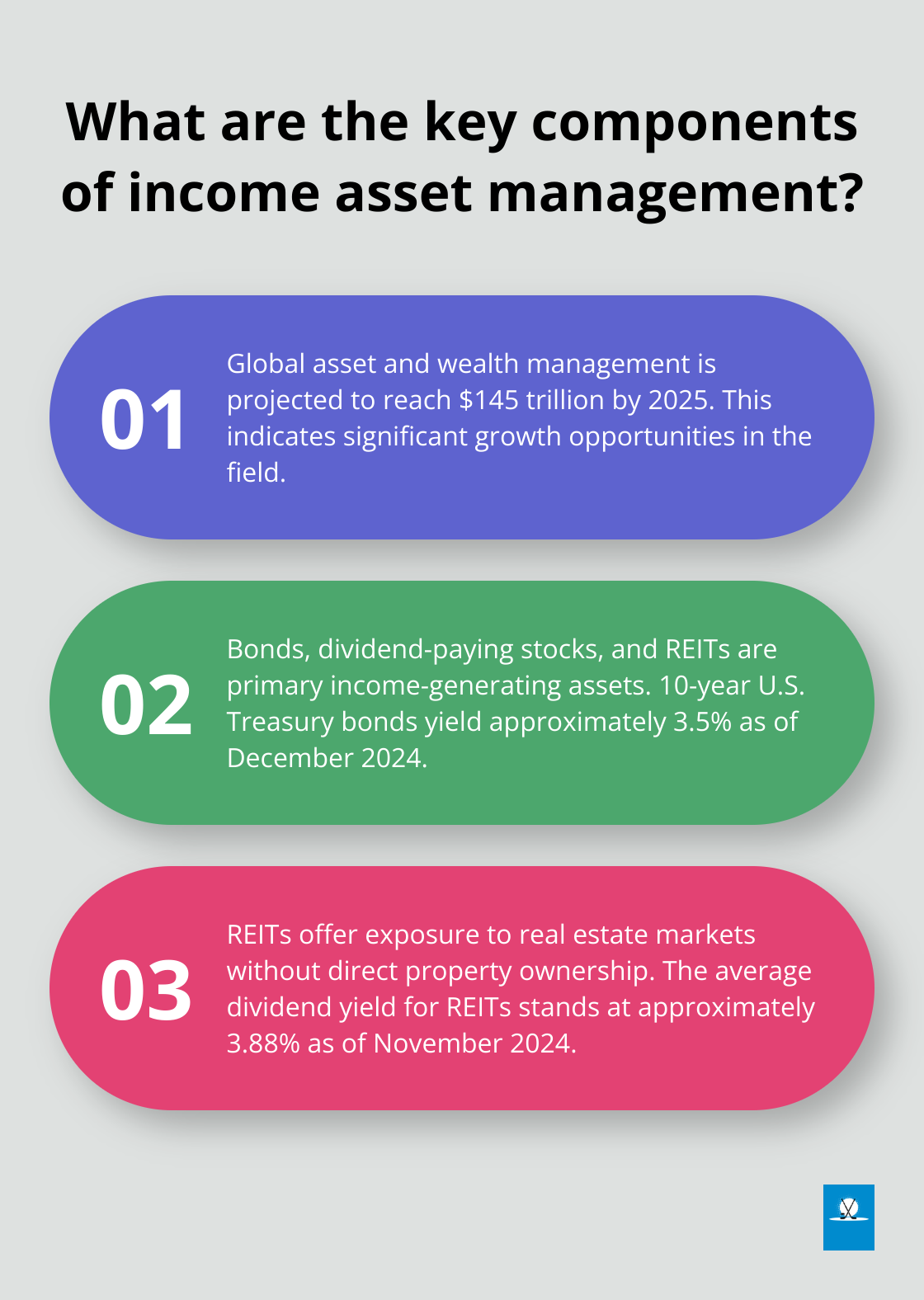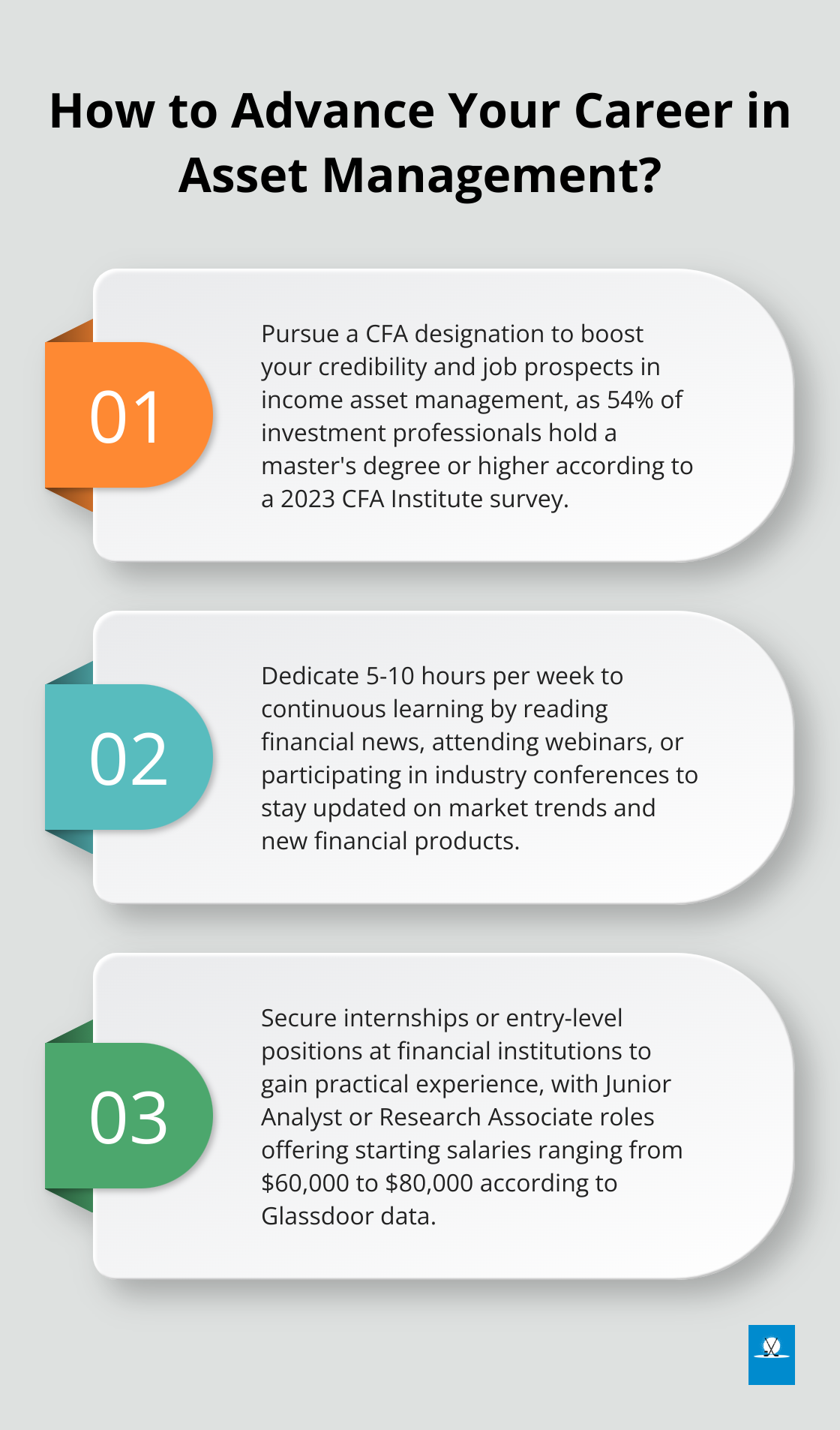At Pro Hockey Advisors, we’ve seen many athletes transition into successful careers after their time on the ice. One field that’s caught our attention is income asset management.
This dynamic sector offers exciting opportunities for those with a keen financial mind and a drive to maximize returns. In this post, we’ll explore how to build a career in income asset management, from essential skills to education paths and job prospects.
Whether you’re considering joining an income asset management group or starting your own venture, we’ll provide the insights you need to get started.
What Is Income Asset Management?
Definition and Scope
Income asset management is a specialized field within financial services that focuses on maximizing returns from income-generating assets. This sector attracts professionals (including former athletes) who excel in discipline and strategic thinking.

Income asset managers work with various assets designed to provide regular cash flows. These include bonds, dividend-paying stocks, real estate investment trusts (REITs), and royalties from intellectual property. The primary objective is to create a steady income stream for clients while preserving and growing their capital.
A 2023 PwC report projects the global asset and wealth management industry to reach $145 trillion in assets under management by 2025, indicating significant growth opportunities in this field.
Types of Income-Generating Assets
Bonds
Bonds form a cornerstone of income asset management. Government bonds, corporate bonds, and municipal bonds offer regular interest payments. As of December 2024, 10-year U.S. Treasury bonds yield approximately 3.5%.
Dividend-Paying Stocks
Dividend-paying stocks represent another key component. Companies like Johnson & Johnson, which have increased their dividends for over 50 consecutive years, attract income-focused investors.
Real Estate Investment Trusts (REITs)
REITs provide exposure to real estate markets without direct property ownership. According to data from the National Association of Real Estate Investment Trusts, the average dividend yield for REITs stands at approximately 3.88% as of November 2024.
Essential Skills for Success
Financial Analysis
Success in income asset management requires strong financial analysis skills. Professionals must assess company health, understand bond ratings, and evaluate potential risks and returns of various assets.
Risk Management
The ability to construct diversified portfolios that balance risk and reward is essential. This involves understanding concepts like correlation and modern portfolio theory.
Communication
Effective communication skills prove vital in this field. Professionals often explain complex financial concepts to clients who may lack a finance background. Building trust and maintaining client relationships contribute to long-term success.
Adaptability
The financial markets constantly evolve, requiring income asset managers to stay ahead of trends. This might involve incorporating new asset classes or adapting to changing regulations.
As we move forward, we’ll explore the education and qualifications necessary to excel in this dynamic field. Understanding these requirements will help aspiring professionals chart their path to success in income asset management.
Paving Your Path in Income Asset Management
Educational Foundations
A successful career in income asset management requires a solid educational foundation. Most positions demand at least a bachelor’s degree in finance, economics, accounting, or a related field. Top universities like Harvard, Stanford, and MIT offer relevant programs that cover essential topics such as financial analysis, portfolio management, and risk assessment.

However, a bachelor’s degree alone often falls short. Many employers prefer candidates with advanced degrees, particularly an MBA or a Master’s in Finance. A 2023 survey by the CFA Institute revealed that 54% of investment professionals hold a master’s degree or higher.
Professional Certifications
Professional certifications can significantly boost your credibility and job prospects. The Chartered Financial Analyst (CFA) designation stands as the gold standard in the investment management industry. This challenging program prepares professionals for careers as Investment Analysts, Portfolio Managers, Strategists, Consultants, and Wealth Managers.
Other valuable certifications include:
- Certified Financial Planner (CFP)
- Financial Risk Manager (FRM)
- Chartered Alternative Investment Analyst (CAIA)
These certifications demonstrate your expertise and commitment to the field, potentially leading to higher salaries and better job opportunities.
Continuous Learning
The financial world evolves constantly, making continuous learning essential. Stay updated on market trends, new financial products, and regulatory changes. Many professionals dedicate at least 5-10 hours per week to reading financial news, attending webinars, or participating in industry conferences.
Consider subscribing to publications like The Wall Street Journal, Financial Times, or Bloomberg. Online platforms such as Coursera and edX offer courses from top universities, allowing you to expand your knowledge base without committing to a full degree program.
Building Your Network
Networking plays a vital role in the finance industry. Almost 100% of professionals believe that face-to-face meetings build stronger long-term relationships. Attend industry events, join professional associations (like the Investment Management Consultants Association), and use social media platforms such as LinkedIn to connect with industry professionals.
Many successful income asset managers credit informational interviews as a key factor in their career progression. Reach out to professionals in your desired role and request a 15-30 minute chat about their career path and advice.
Practical Experience
While education and certifications provide a strong foundation, practical experience proves invaluable in the income asset management field. Try to secure internships or entry-level positions at financial institutions, investment firms, or asset management companies. These opportunities allow you to apply theoretical knowledge to real-world scenarios and gain hands-on experience in portfolio management, financial analysis, and client relations.
As you progress in your career, you’ll need to stay adaptable and open to new opportunities. The next section will explore various career paths and opportunities within income asset management, helping you chart your course in this dynamic field.
Navigating Career Paths in Income Asset Management
Entry-Level Opportunities
Income asset management offers diverse career paths with opportunities for growth and specialization. Most professionals enter this field through entry-level positions such as Junior Analyst or Research Associate. These roles typically involve support for senior team members, market research, and assistance with portfolio analysis. The average starting salary for these positions ranges from $60,000 to $80,000 (according to data from Glassdoor).

To stand out in the competitive job market, internships at reputable firms prove valuable. Many top asset management companies offer summer internship programs that can serve as a springboard into full-time positions.
Career Progression
As professionals gain experience, they can advance to roles such as Portfolio Manager or Investment Strategist. These positions come with increased responsibility and higher earning potential. The U.S. Bureau of Labor Statistics reports that the median annual wage for financial managers (which includes many roles in asset management) was $134,180 in May 2023.
Career advancement often requires a combination of performance, additional certifications, and sometimes an advanced degree. Many successful professionals in this field hold an MBA or a Master’s in Finance, in addition to certifications like the CFA.
Specialization Areas
Income asset management offers various specialization paths. Some professionals focus on specific asset classes like fixed income or real estate investment trusts (REITs). Others specialize in particular sectors, such as technology or healthcare.
Sustainable investing represents another growing area of specialization. A report by the Global Sustainable Investment Alliance indicates that sustainable investing assets reached US$35 trillion globally in 2020. This trend suggests increasing opportunities for professionals who can integrate environmental, social, and governance (ESG) factors into income asset management strategies.
Market Outlook and Compensation
The job market for income asset management professionals remains robust. The U.S. Bureau of Labor Statistics projects a 17 percent growth in financial manager positions from 2023 to 2033, much faster than the average for all occupations.
Salary potential in this field can be substantial, especially at senior levels. While entry-level positions start around $60,000-$80,000, experienced Portfolio Managers can earn well into six figures. A 2023 survey by CFA Institute revealed that the median total compensation for CFA charterholders in the United States was $177,000.
Compensation often includes performance-based bonuses, which can significantly increase total earnings. Some top-performing fund managers earn millions annually, though such positions are highly competitive and require exceptional track records.
Final Thoughts
A career in income asset management offers exciting opportunities for those passionate about finance and maximizing returns. Success in this field requires a solid educational foundation, continuous learning, and a mix of technical and soft skills. Understanding various income-generating assets proves essential for crafting effective investment strategies.

The path to success often starts with relevant degrees and certifications, such as the CFA designation. Practical experience, gained through internships and entry-level positions, applies theoretical knowledge to real-world scenarios. As professionals advance, they can specialize in specific asset classes or sectors, leading to higher-level positions and increased earning potential.
For athletes transitioning to new careers, the discipline and strategic thinking from sports can translate well to income asset management groups. At Pro Hockey Advisors, we offer guidance for those navigating this career transition, providing insights into financial planning and career management strategies. The field presents rewarding challenges and significant growth potential for those prepared to excel in this dynamic industry.



Pingback: Exploring Career Paths for Finance Majors - Pro Hockey Wealth Management & Retirement Planning